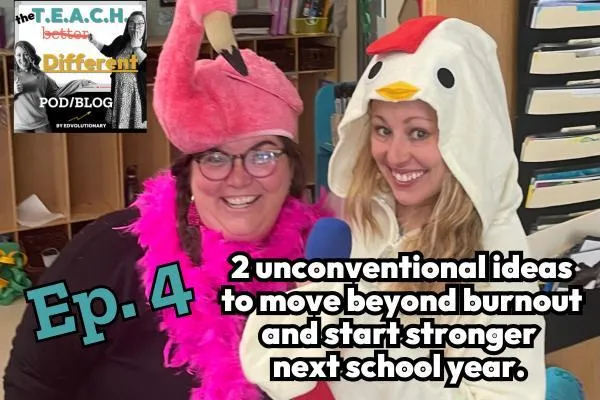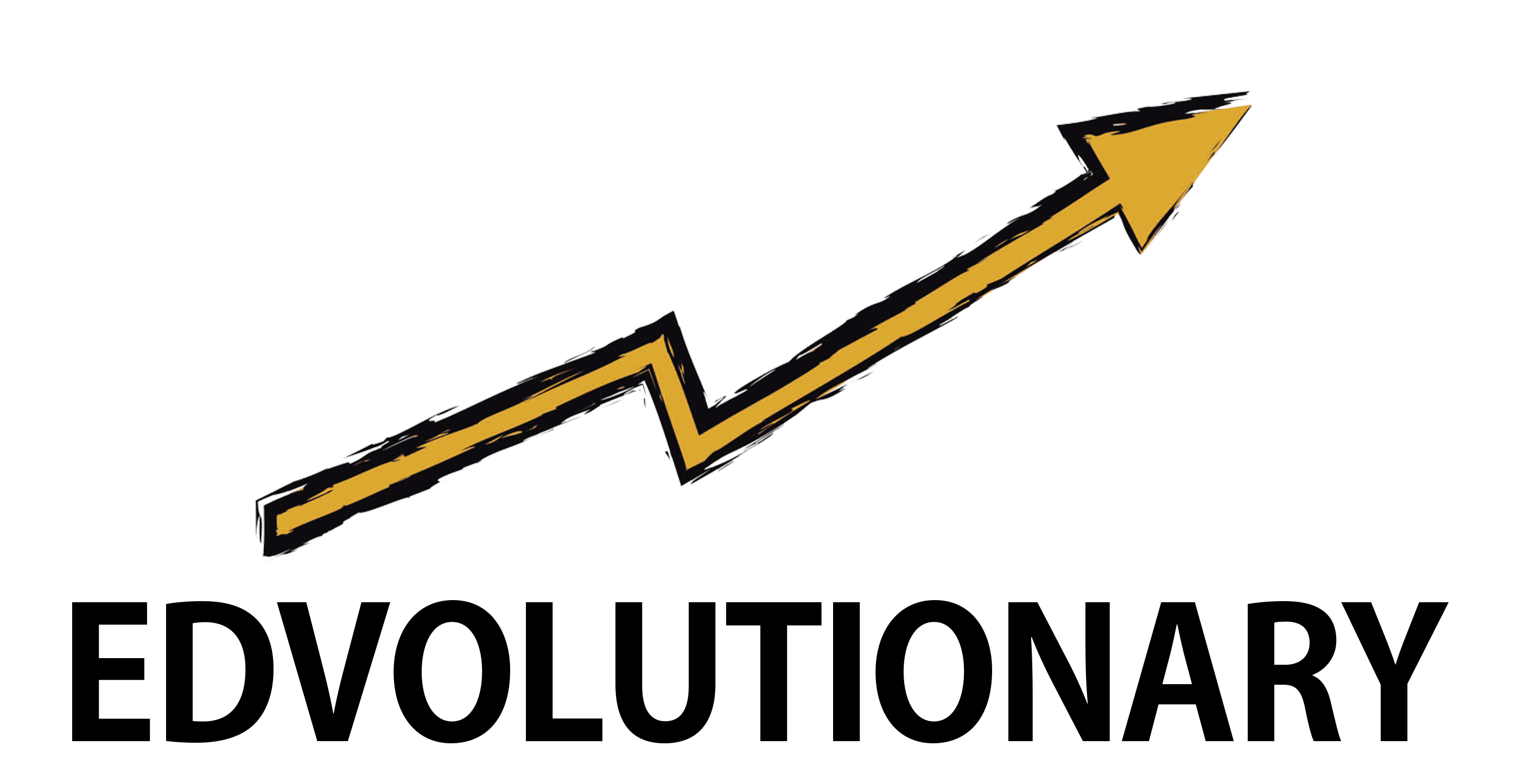The TEACH Different (not better) POD/BLOG
CREATE THE CONDITIONS THAT UNLOCK STUDENT ENGAGEMENT, ACHIEVEMENT, & WELLBEING

4: Two unconventional ideas to move beyond burnout and start stronger next school year
Listen to the episode:
This week's post is brought to you by the letter T! Learn more about the TEACH Framework here.
Grab this week's companion workbook in the form at the bottom of this post under "Time for Action."
Get notified about our TEACH Different Community- opening in July!
Post/Episode Summary:
If you’re listening to this episode at the time of it’s release- CONGRATS! You’re probably on summer break and it feels so, so gooooooooood.
It’s easier at this time to feel distance from the burnout common to many educators during the year.
If you want to hold onto that feeling and try to prevent burnout next school year, you MUST take a listen to this episode.
Don’t expect any wise words on yoga, meditation, or meal prepping. This is the unexpected stuff that will take you deeper….if you dare.
Origin Story
My first two years of teaching I taught 3rd grade at a charter school in chicago with a co-teacher model. My first couple months started off really, really rough. I shared a classroom with a veteran teacher who wanted an assistant…not an inept teammate that needed so much help and guidance it was MORE work than just teaching everything herself.
But my principal saw something in me. And instead of giving me the boot, she put me in a classroom with another teacher who had been through a similar trial by fire, was young in her career, and willing to help. We had a fantastic year together. Too fantastic because they separated us the next year so we could head our own classrooms with two new co-teachers.
But it was fine. It was my second year with the curriculum and although I obviously still had a lot to learn in year two of teaching, I felt like I was trusted and allowed to be myself in the classroom– which led my confidence to soar and my ego to seek out support when I needed it and not be derailed by challenges.
My co-teacher that year used to tell me I was like the pied piper with our students– that they would follow me anywhere and any lesson I took them on. It felt like a magical exchange of energy made possible by a group of humans large and small who were just free to be themselves.
My third year of teaching I decided to move to Denver and went from teaching 3rd to 6th grade as a founding teacher at a new branch of a local charter school network. I think i had two 90 minute sections of literacy with 34 6th graders in each packed into a long narrow room. And we taught everything out of printed packets. You’d think that was a recipe for disaster (and it definitely was a recipe for Miss… what IS the point of this) but I actually enjoyed the sassiness of 12 year olds, engaging them in my usual showmanship, had a lot of great founding colleagues that I had good planning time to collaborate with, and when our first testing came back in October… our students had done really well and were at the top compared to the other schools in our network.
It was the time of my first evaluation… and I knew there were always things I could work on but I felt like things were going well.
You can't make this shit up
Only apparently they weren’t entirely. Sure my scores were good and kids were learning and generally happy, but my principal age 25 informed me that he had run the demerit reports and that I (and several other teachers) were clearly not holding high enough expectations and it was starting to cause problems for the teacher giving lots of demerits and upholding school norms who students were frequently professing to not like.
Something that should be noted is that when I was interviewed for the position, and told about demerits and bonus bucks, I told them I could not work there if they made me use such a punitive consequence and reward system. And I had another job offer so I had leverage.
They assured me it could be used as much or as little as teachers were comfortable with. And so when kids came in with shirts untucked…. instead of giving a demerit I would just remind them to do it so someone else wouldn’t make me give them a demerit (which always worked). When they said “miss. Why do we have to learn this?” in an annoyed sassy 12 year old way instead of giving them a demerit for disrespect I would pop back in their face with something sassy instead, and the situation would be diffused in an instant.
So when told I needed to increase my demerits–I brought this up, was told that if we didn’t comply and have the same expectations in every classroom we’d be on a slippery slope to the school going to hell.
So for several weeks, our admin team sat in the back of us low expectations teachers classrooms with green and red cards and held them up when we should give a demerit or a bonus buck for students breathing the wrong way or the right way. I went from authentically responding human to human with my students to a robotic: “Nathan. That is disrespectful. That’s a demerit. Evelyn. Your shirt needs to be tucked in. That’s a demerit.”
Oh and did I mention one demerit got you lunch at the silent lunch table or loss of your one movement break of the day… and so the aftermath of each demerit cost the class huge disruptive reactions from every student held to account. And then those reactions got another demerit… which often led to another reaction and another demerit…and 3 demerits got you the afternoon in the restoration room, so we had a lot of boys start to miss a lot of class.
And then one day… apparently I had graduated from police academy, so they gave me a vibrator to put in my pocket that went off every 1 minute so I could remember to scan for misbehavior (you cannot make this shit up) and left me to rule over my den of oppression.
Only…. I still did not believe in the system of demerits and bonus bucks. And now I had completely eroded the trust my students had in me of being any consistent kind of adult figure… and so these consequences and rewards became the only way to maintain any semblance of order because there was definitely no longer mutual respect and understanding.
And so for the remainder of that year, things got worse, and worse and worse for my classroom AND around the school. It got worse for the teacher already upholding high expectations because the students still didn’t like her. And it happened in the classrooms for all of us who were asked to compromise our authentic selves for an inhuman fear-based system of compliance.
And the admins worst fears about the school descending into hell became a self-fulfilling prophecy. And all of us who had experienced this ended up leaving when they refused to change the plan for the following year. It was assumed that if we all just got better at complying… it would eventually work.
I almost stopped teaching right then and there but ended up finding a school that was much more aligned to my values.
But something drastic had happened. Something that has followed me ever since in varying degrees. Even when I was in environments that better aligned with my teaching philosophy.
I’m guessing many of you out there have also had this happen to you to greater or lesser extents. And it might be holding you back from unlocking your superpowers and truly thriving as a teacher and as a result, your life outside of teaching as well.
So what happened?
So you figured out what happened in the story, right?
Setting aside my values in order to fit the cultural expectation of the school severed my trust in my own inner wisdom that had led me to be so authentic, effective and engaging in my relationships and teaching with students.
And so for the remaining 7 years I taught, I subconsciously began to second guess nearly every move I made– trying to figure out what the “right” move was to meet the expectations of the environment I found myself in (aka stay safe) while trying to do what my values were telling me to do (aka trust myself). It became a pretty exhausting tug-of-war that led to draining perfectionism, overthinking… and less natural success in building connections with and engaging my students, even as I technically “got better” at many aspects of teaching.
One of the core wirings of our cave man-era human brains is the desire to belong- so we don’t get ousted from the group and can survive. Everyone has a different story, but many of us at one time or another disconnect from ourselves, or a least hide a part of it in exchange for this perceived safety, and in my experience it heavily contributes to our mental and emotional burnout and limits the full expression of our potential.
WWTSD?
So… the question is… can we fix it?
A few weeks ago I watched the Netflix documentary Miss Americana about Taylor Swift. Highly recommend. She talked about how early in her career she focused so much energy on bending herself to be the kind of person everyone would like.
But people took advantage of her both from a professional standpoint and personal one despite all she did to comply with the world’s expectations of her (aka be good, stay safe).
And so she made the decision that the only choice she had was to be totally authentic and true to herself because clearly trying to please everyone was going nowhere.
Now look at her. She is the Time Person of the Year, one of the wealthiest women in the world, and has a legion of loyal fans that will not let you take a shot at her.
By trusting herself… and owning the good and especially the messy… and not worrying about how it fit in with what people expected of her….she unlocked her superpower. And there’s no denying its a superpower.
That’s the power I see in my co-founder Annie who spent nearly her entire 15 years of teaching with a principal who believed in her as a person, and proved that through trusting her to be her authentic self even when it involved taking a risk or coloring outside the lines.
That’s also the power I felt brewing in my first couple years of teaching despite the fact I was also in in grad school at night multiple days a week, in professional development or meeting with my designated coaches often on weekends, we had an extended school day and a shortened summer. I should have been totally burned out but the high I got from getting to show up every day and be totally authentic even while doing all the things fueled me rather than drained me.
Many of you, like me after year 3 of teaching…may have had that energy interrupted at some point.
But we can reclaim it.
And so for the rest of this episode, I’m going to share the resources that have helped me do that in hopes it can help you too.
Even though I’m no longer in the classroom, these resources have helped me get to the point where I can be my authentic self and share all the positive and messy and potentially crazy things I think with potentially even more people… like on this podcast….which is infinitely more terrifying to me than speaking up around a handful of colleagues.
Before we dive in– I do have a companion workbook for this in both pdf and Googlesheet that you can grab in the form at the bottom of this blog post.
How to get started unlocking your own superpowers
Okay… now for two tools to get you moving on this journey:
The first tool I discovered that allowed me to become more aware of the messy and positive parts of myself and begin the journey of acceptance was The Enneagram.
The enneagram falls into the category of personality typing, but having been in the education space I’ve done them all and I find the enneagram 100 million x more useful than all the rest. It also helps you understand the positive and messy side of others in your life, and leads to so much more patience and generosity for them as well. Good practice in our work with students! You can Google it or find my suggested path to getting started with it in the workbook.
The second tool that helped most recently is a book called Claim Your Power by Mastin Kipp and I’m going to talk more in depth about a particular exercise from this 40 day journey he takes you on (but I recommend the whole thing, especially if you are on summer break!)
I led a group of friends through his exercise on finding your purpose and we we were blown away by how powerful and spot on the exercise was for each of us.
Now purpose is a word that gets thrown around alot… and often get’s defined as the thing we’ve chosen to do– like be a teacher, or activist or parent.
But he describes it… and stay with me if you’re a little wary of woo woo and feelings and the things that make us human: he describes it as an emotion you cultivate within yourself and give away to the world in the form of service to others.
I am going to share mine and then tell you how this simple fluffy seeming thing can act as a lightpost when you are in those moments of tension between who you are and who you think you’re supposed to be.
When you go through this exercise in the companion workbook, you’ll go through a whole process that leads you to identifying two core emotions that you’ll then put into your purpose sentence: The template of the purpose statement is as follows: The purpose of my life is to ________ to myself and feel the ________ that results while inspiring others to feel the same.
When I went through it, the two core emotions that came out for me were belonging and freedom. And when placed in my purpose sentence it sounds like this: The purpose of my life is to belong to myself and feel the freedom that results while inspiring others to feel the same.
Okay now that I’ve thoroughly unimpressed most of you, let me share how powerful having this sentence was for me in recent times.
Last December, Annie and I presented at an education conference on the power of play. I put a lot into planning for the session because It was my first ever to present at, and perfectionism is my safety mechanism… and yet… the night before… I wanted to change everything to play it even more safe.
I thought… this is too different than people will be used to. This is SO different from any of the sessions I’ve sat through so far! What if people feel uncomfortable? What if it doesn’t resonate with them? What if they think I’m bat-shit crazy?
All my fears around not belonging, right?
And then I remembered my purpose statement because I had just done this exercise with my friends two nights before.
My purpose is to belong to myself and feel the freedom that results while inspiring others to do the same.
And so I chose to ignore those fears of not belonging in that moment. The next morning, bright at early at 8am, Annie and I conducted the session… exactly as originally planned.
And immediately that feeling of freedom that comes from fully living uncensored in your own truth that I had experienced in my first two years of teaching came back… in an incredibly healing and powerful way in that moment for me.
At the end of the session of 130 + educators, and for the rest of the day after, we had so many individuals come up and say things to the effect of “that was the most useful session I’ve been to so far.” or even more common and profound to me… “I’ve been going around to these sessions and I feel like I’ve finally found my people.”
By choosing to belong to myself and not let fear of external belonging change how I showed up… not only did I feel amazing but I was able to give that feeling of freedom and belonging away to others who might have missed that feeling of belonging and connection had I chosen to forgo authenticity for perceived safety.
It was totally a taylor swift moment in my own little right, and I 100% believe we all need to unlock this power within our own classrooms and spheres of influence if we want to both shut down burnout and create the powerful ripples of change we hope to see in education.
Time for Action:
To connect back to last week’s episode… especially for those struggling to do something that feels like it prioritizes YOU: One thing I have learned in my personal life is that the quality of our relationships with others starts with the quality of our relationship with ourselves.
If we don’t do this work… and come to a place of grace, acceptance, and connection to our own innate power and value, we will continue to create learning environments that don’t allow for that in our students either. And the work we do will with students continue to be infinitely harder and less effective as a result.
So download this workbook!
Also…If you want to join a community further diving into these topics and others of our TEACH Framework, don’t forget to sign up to be notified when our TEACH Different Collective opens later this summer! To read about our initial vision, give your input and/or join the list to get notified when this community opens, go to edvolutionary.com/collective. You can also add your name to the notification list using the form below!
All links from this post/episode
Thank you for being on the journey with us as we build out this content
What do we mean by TEACH Different (not better?)


